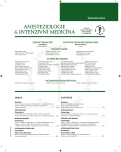Survey of transfusion practices in Jehovah’s Witnesses
Authors:
R. Černá Pařízková 1; D. Seidlová 2; V. Černý 1,3,4,5
Authors‘ workplace:
Klinika anesteziologie, resuscitace a intenzivní medicíny, Univerzita Karlova v Praze, Lékařská fakultav Hradci Králové, Fakultní nemocnice Hradec Králové
1; II. anesteziologicko-resuscitační oddělení, Klinika anesteziologie, resuscitace a intenzivní medicíny, Lékařská fakulta Masarykova univerzita Brno, Fakultní nemocnice Brno
2; Klinika anesteziologie, perioperační a intenzivní medicíny, Univerzita J. E. Purkyně v Ústí nad Labem, Masarykova nemocnice v Ústí nad Labem
3; Centrum pro výzkum a vývoj, Fakultní nemocnice Hradec Králové
4; Dept. of Anesthesia, Pain Management and Perioperative Medicine, Dalhousie University, Halifax, Canada
5
Published in:
Anest. intenziv. Med., 26, 2015, č. 5, s. 263-269
Category:
Anaesthesiology - Original Paper
Overview
Objective:
The aim of the study was to explore attitudes and clinical practices of anesthesiologists in the Czech Republic towards patients‘ refusal of blood transfusion.
Design:
A prospective questionnaire.
Materials and methods:
An anonymous questionnaire was sent by e-mail to the physicians who were members of the Czech Society of Anesthesiology and Intensive Care Medicine (CSARIM). The physicians were asked about their opinion and clinical practice in patients refusing blood transfusion in life-threatening haemorrhage situations.
Results:
Two hundred and forty responses were obtained. Most respondents – 218 (91.2%) – expressed their views. Thirty nine (28.9%) respondents would give transfusion against patients‘ wishes. The majority of anesthesiologist – 159 (69%) – would override the patients‘ will and give blood transfusion in life-threatening bleeding. One hundred and nine (51%) respondents would fully respect patients‘ will regardless of the severity of their medical condition, 104 (49%) anesthesiologists would give blood transfusion if it is necessary for saving the patient’s life. No difference was found between male and female respondents with regard to their opinion on blood tranfusion. Less experienced physicians (clinical practice less than 10 years) would respect the patients‘ wishes more likely than physicians with clinical practice of 10 years and more.
Conclusion:
Czech anesthesiologists respect patients‘ will about blood transfusion, however if the patient is at risk of death due to bleeding, more than half of the responding physicians would give blood transfusion regardless of the patients‘ will.
Keywords:
Jehovah’s Witnesses – blood transfusion
Sources
1. Úmluva na ochranu lidských práv a důstojnosti lidské bytosti v souvislosti s aplikací biologie a medicíny (Úmluva o lidských právech a biomedicíně), č. 96/2001 Sb., 00419.pdf.
2. Zákon č. 372/2011 Sb., o zdravotních službách a podmínkách jejich poskytování (o zdravotních službách), ve znění zákona č. 167/2012 Sb., zákona č. 437/2012 Sb. a zákona č. 66/2013.
http://portal.gov.cz/app/zakony/zakonPar.jsp?idBiblio=75500&nr=372~2F2011&rpp=15#local-content
3. Černá Pařízková R., Mach J. Svědkové Jehovovi. Část druhá – eticko právní problematika., Anest. Intenziv. Med., 26, 2015, č. 3, s. 188–193.
4. Biscoe, Kidson-Gerber, G. ‘Avoidable’ death of a pregnant Jehovah’s Witness with acute promyelocytic leukaemia: ethical considerations and the internal conflicts and challenges encountered by practitioners. Internal Medicine Journal, 2015, 45, 4, p. 461–462.
5. Rajtar, M. Bioethics and religious bodies: Refusal of blood transfusions in Germany. Social Science & Medicine, 2013, 98, p. 271–277.
6. Cahana, A., Weibel, H., Hurst, S. A. Ethical Decision-Making: Do Anesthesiologists, Surgeons, Nurse Anesthetists, and Surgical Nurses Reason Similarly? Pain Medicine, 2008, 9, No 6.
7. Banja, J. D. Overriding the Jehovah’s Witness Patient’s Refusal of Blood: A Reply to Cahana, Weibel, and Hurst. Pain Medicine, 2009, 10, No 5.
8. Dirksen, H. H. The right of self-determination e why not valid for Jehovah’s Witnesses? Thoracic and Cardiovascular Surgery, 2004, 52, p. 252–253.
9. http://nalus.usoud.cz/Search/GetText.aspx?sz=3-459-03.
10. http://www.independent.ie/lifestyle/health/jehovahs-witness-forced-to-have-lifesaving-transfusion-26366172.html.
11. http://www.krev.info/Text/irsko_dilema.htm.
12. Seidlová, D., Weinberger, V. Metody bezkrevní péče v gynekologii a onkogynekologii. Česká gynekologie, 2014, 79, č. 6, s. 493–498.
13. Vincent, J. L. Transfusion in the exsanguinating Jehovah’s Witness patient – the attitude of intensive care physicians. Eur. J. Anaesthesiol., 1991, 8, p. 297–300.
14. Lawson, T., Ralph, C. Perioperative Jehovah’s Witnesses: a review. British Journal of Anaesthesia, 2015, p. 1–12.
Labels
Anaesthesiology, Resuscitation and Inten Intensive Care MedicineArticle was published in
Anaesthesiology and Intensive Care Medicine

2015 Issue 5
-
All articles in this issue
- Survey of transfusion practices in Jehovah’s Witnesses
- Comparison of heparin and citrate anticoagulation during continuous veno-venous haemodialysis (CVVHD) in critically ill children – prospective, crossover study
- Echocardiography for preload and fluid responsiveness assessment
- Practice advisory on anesthetic care for magnetic resonance imaging
- Patophysiology and diagnostics of anaphylactic syndrome of pregnancy
- The 140th anniversary of the opening of the “St. Apollinaire’s” National Maternity Hospital
- Anaesthesiology and Intensive Care Medicine
- Journal archive
- Current issue
- About the journal
Most read in this issue
- Comparison of heparin and citrate anticoagulation during continuous veno-venous haemodialysis (CVVHD) in critically ill children – prospective, crossover study
- Patophysiology and diagnostics of anaphylactic syndrome of pregnancy
- Echocardiography for preload and fluid responsiveness assessment
- Practice advisory on anesthetic care for magnetic resonance imaging
